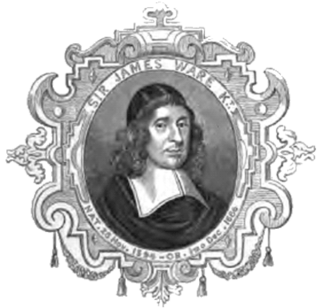Related Research Articles

Richard James Mulcahy was an Irish Fine Gael politician and army general who served as Minister for Education from 1948 to 1951 and 1954 to 1957, Minister for the Gaeltacht from June 1956 to October 1956, Leader of the Opposition from 1944 to 1948, Leader of Fine Gael from 1944 to 1959, Minister for Local Government and Public Health from 1927 to 1932 and Minister for Defence from January to April 1919 and 1922 to 1924. He served as a Teachta Dála (TD) from 1918 to 1938 and from 1943 to 1961 and a Senator from March 1938 to June 1938 and 1943 to 1944. He served in the cabinets of W. T. Cosgrave and John A. Costello.

Rory O'Donnell, 1st Earl of Tyrconnell, was an Irish Gaelic lord, the last King of Tyrconnell. He was a younger brother of Hugh Roe O'Donnell and became the 1st Earl of Tyrconnell.
Dubhaltach Mac Fhirbhisigh, also known as Dubhaltach Óg mac Giolla Íosa Mór mac Dubhaltach Mór Mac Fhirbhisigh, Duald Mac Firbis, Dudly Ferbisie, and Dualdus Firbissius was an Irish scribe, translator, historian and genealogist. He was one of the last traditionally trained Irish Gaelic scholars, and was a member of the Clan MacFhirbhisigh, a leading family of northern Connacht. His best-known work is the Leabhar na nGenealach, which was published in 2004 as The Great Book of Irish Genealogies, by Éamonn de Búrca, more than 300 years after it had been written.
Risteard Cooper is an Irish actor, comedian, singer and writer and is one third of comedy trio Après Match.
Risteárd de Tiúit was an Anglo-Norman nobleman and a member of Richard de Clare, 2nd Earl of Pembroke's Irish invasion force, and Lord Chief Justice of Ireland. His part in the original invasion is acknowledged in The Song of Dermot and the Earl, which recorded his grant of land in the western part of Meath under the authority of Hugh de Lacy in Trim.
Richard Creagh was an Irish Roman Catholic clergyman who was the Archbishop of Armagh and Primate of All Ireland during the reign of Queen Elizabeth I. Along with the other Irish Catholic Martyrs, Archbishop Creagh is under investigation for possible Roman Catholic Sainthood. His current title is Servant of God.
Paul Walsh was an Irish priest and historian.

Sir James Ware was an Anglo-Irish historian.

The Library of Trinity College Dublin serves Trinity College. It is a legal deposit or "copyright library", under which, publishers in Ireland must deposit a copy of all their publications there, without charge. It is the only Irish library to hold such rights for works published in the United Kingdom.

Richard Irvine Best was born at 3 Bishop Street in Derry, Ireland. He was often known as R. I. Best, or simply Best to his close friends and family. He was an Irish scholar, specifically a philologist and bibliographer, who specialised in Celtic Studies.

Colonel Thomas de Burgh, always named in his lifetime as Thomas Burgh, was an Anglo-Irish military engineer, architect, and Member of the Parliament of Ireland who served as Surveyor General of Ireland (1700–1730) and designed a number of the large public buildings of Dublin including the old Custom House (1704–6), Trinity College Library (1712–33), Dr Steevens' Hospital (1719), the Linen Hall (1722), and the Royal Barracks.
Colonel Gordon O'Neill, was an officer in King James II's Irish army who fought at the Siege of Derry, the Battle of the Boyne, and the Battle of Aughrim for the Jacobites.
Seon Mac Solaidh, aka Sean or John Mac Solly, Irish poet and scribe, fl. 1720s.
John Lodge (1692–1774) was an English archivist and historian, best known for his work The Peerage of Ireland, a complete genealogical history of Irish peers.

Richard James Hayes was an Irish code-breaker during World War II and was Director of the National Library of Ireland.
Lexicography evolved in order to serve one of two needs i.e. in order to explain in a simple way difficult words and expressions or in order to explain the words and expressions of one language in another. In this case we can trace the tradition of lexicography in Irish back to the 8th century.
Theophilus Bolton, D.D. (1678–1744) was an Anglican bishop in Ireland in the 17th century. He is known for establishing the Bolton Library.

Richard Helsham was an Irish physician and natural philosopher at Trinity College Dublin. He was the inaugural Erasmus Smith's Professor of Natural and Experimental Philosophy from 1724 and Regius Professor of Physic from 1733.
Richard Power was an Irish novelist and script-writer.
Risteárd is an Irish masculine given name. It is the Irish equivalent of Richard. Risteárd is a French-influenced variant of Riocárd. Three babies were given the name Risteárd in 1975, but the 1964–1974 period and the following years had less than three babies given the name annually.
References
- ↑ "Tuibear, Risteard (Richard Tipper)". Dictionary of Irish Biography . October 2009. doi:10.3318/dib.008565.v1 . Retrieved 1 May 2024.
- ↑ "Tuibear, Risteard (fl.1710–1730)". ainm.ie (in Irish). National Database of Irish-Language Biographies. Retrieved 1 May 2024.
- 1 2 3 Walsh, Paul (1933). "Gleanings from Irish manuscripts (2nd edition)". Dublin – via National Library of Scotland.